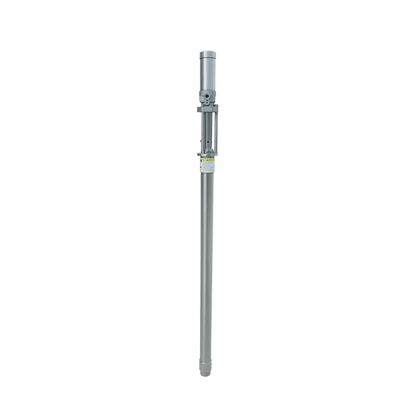What is a piston pump?
In the world of fluid dynamics and hydraulic systems, one device stands out as a true powerhouse – the piston pump. This versatile and vital component plays a crucial role in industries ranging from manufacturing and construction to agriculture and automotive. In this article, we'll take a deep dive into what a piston pump is, how it works, its applications, and why it's considered a cornerstone of modern engineering.
Defining the Piston Pump:
At its core, a piston pump is a mechanical device designed to move fluids through a system by using reciprocating motions. It's a type of positive displacement pump, meaning that it moves a fixed volume of fluid with each stroke, providing consistent and precise flow. The key components of a piston pump include a cylinder, a piston, and inlet/outlet valves.
The piston, often cylindrical in shape, moves back and forth within the cylinder. As the piston moves, it creates pressure changes within the cylinder, which in turn cause fluid to be drawn in through the inlet valve and pushed out through the outlet valve.
How Does It Work?
The operation of a piston pump can be broken down into several stages:
Intake Stage:
During the intake stage, the piston is retracted, creating a low-pressure area within the cylinder. This lower pressure causes the inlet valve to open, allowing fluid to flow into the cylinder.
Compression Stage:
As the piston starts to move forward, it compresses the fluid within the cylinder. This compression increases the pressure of the fluid, causing the outlet valve to open and allowing the fluid to exit the cylinder.
Discharge Stage:
Once the fluid is sufficiently compressed, the outlet valve opens fully, and the high-pressure fluid is pushed out of the cylinder and into the hydraulic system.
Return Stage:
As the piston reaches the end of its forward stroke, it starts to retract again. This movement creates a low-pressure area within the cylinder, causing the inlet valve to open and allowing fluid to flow in for the next cycle.
This repetitive cycle of intake, compression, discharge, and return is what enables a piston pump to continuously move fluid through a hydraulic system.
Types of Piston Pumps:
There are various types of piston pumps, each designed for specific applications and operating conditions. Some common types include:
Axial Piston Pump:
In this design, pistons move parallel to the pump's drive shaft. Axial piston pumps are known for their efficiency and high power-to-weight ratio, making them suitable for demanding applications.
Radial Piston Pump:
Radial piston pumps feature pistons that move outward from the center of the pump, perpendicular to the drive shaft. These pumps offer high pressure capabilities and are often used in heavy-duty applications.
Swash Plate Pump:
Swash plate pumps use a swash plate that tilts to change the angle of the pistons' strokes. This design provides variable displacement capabilities, allowing for precise control of fluid output.
Bent-Axis Piston Pump:
Bent-axis piston pumps combine axial and radial piston pump designs. They are known for their compact size, high efficiency, and ability to handle high pressures.
Applications of Piston Pumps:
The versatility and reliability of piston pumps make them indispensable in a wide range of industries:
Hydraulic Systems:
Piston pumps play a crucial role in hydraulic systems, powering heavy machinery, construction equipment, and manufacturing processes. Their ability to generate high pressures makes them suitable for tasks requiring substantial force.
Automotive Industry:
In vehicles, piston pumps are used in power steering systems, automatic transmissions, and hydraulic braking systems. These pumps help enhance vehicle control, comfort, and safety.
Agriculture:
Agricultural equipment, such as tractors and combines, rely on piston pumps to operate hydraulic attachments like loaders, plows, and harvesters. The pumps' robust design ensures efficient performance in demanding farm environments.
Industrial Manufacturing:
Manufacturing processes often require precise control over fluid movement. Piston pumps are used in equipment such as injection molding machines, presses, and robotic systems.
Oil and Gas Industry:
Piston pumps are used in oil and gas exploration, extraction, and refining processes. Their ability to handle high pressures and varying fluid viscosities is crucial in these demanding applications.
Aerospace:
Aerospace applications, including aircraft landing gear systems and hydraulic flight control systems, rely on piston pumps for their reliability and consistent performance.
Advantages of Piston Pumps:
The popularity of piston pumps is not accidental; their advantages contribute to their widespread use:
High Pressure Capabilities:
Piston pumps excel at generating high pressures, making them ideal for heavy-duty tasks that require substantial force and pressure.
Precise Control:
The positive displacement nature of piston pumps ensures accurate control over fluid flow rates, making them suitable for applications where precision is critical.
Reliability and Durability:
The robust construction of piston pumps, along with their simple yet effective design, contributes to their reliability and long lifespan.
Wide Range of Fluids:
Piston pumps can handle a variety of fluids, including oils, water, chemicals, and even abrasive materials, depending on the materials used in their construction.
Variable Displacement:
Some piston pump designs offer variable displacement capabilities, allowing operators to adjust fluid output as needed.
Conclusion:
In the world of fluid dynamics and hydraulic systems, the piston pump stands as a remarkable achievement in engineering. Its ability to harness the power of reciprocating motion and convert it into efficient fluid movement has revolutionized industries across the board. Whether in heavy machinery, automotive systems, manufacturing processes, or beyond, the piston pump's reliability, durability, and precision have made it an irreplaceable tool in modern engineering. As technology continues to advance, the piston pump's legacy will undoubtedly remain at the heart of fluid power systems, continuing to drive innovation and progress across a multitude of industries.



